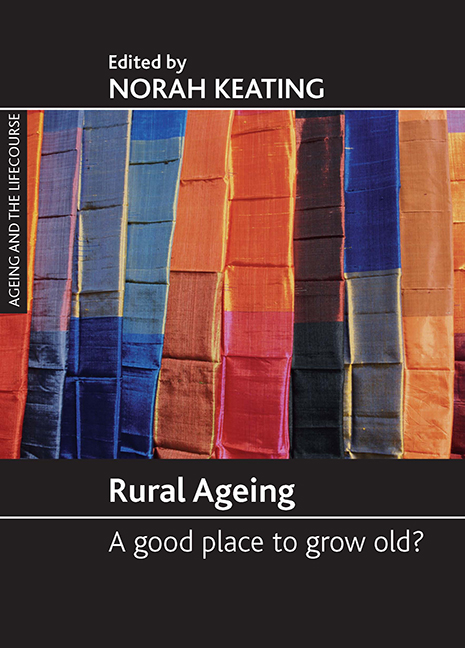Book contents
- Frontmatter
- Contents
- Foreword
- Acknowledgements
- Notes on contributors
- one A critical human ecology perspective on rural ageing
- two Crossing borders: lifecourse, rural ageing and disability
- three Rurality and ageing well: ‘a long time here’
- four The evolution of networks of rural older adults
- five Distance, privacy and independence: rural homecare
- six Respite for rural and remote caregivers
- seven Ageing, disability and participation
- eight Participation in rural contexts: community matters
- nine Staying connected: issues of mobility of older rural adults
- ten Ageing and social exclusion in rural communities
- eleven Age-friendly rural communities
- twelve Revisiting rural ageing
- References
- Index
- Other titles in the Ageing and the Lifecourse series
seven - Ageing, disability and participation
Published online by Cambridge University Press: 19 January 2022
- Frontmatter
- Contents
- Foreword
- Acknowledgements
- Notes on contributors
- one A critical human ecology perspective on rural ageing
- two Crossing borders: lifecourse, rural ageing and disability
- three Rurality and ageing well: ‘a long time here’
- four The evolution of networks of rural older adults
- five Distance, privacy and independence: rural homecare
- six Respite for rural and remote caregivers
- seven Ageing, disability and participation
- eight Participation in rural contexts: community matters
- nine Staying connected: issues of mobility of older rural adults
- ten Ageing and social exclusion in rural communities
- eleven Age-friendly rural communities
- twelve Revisiting rural ageing
- References
- Index
- Other titles in the Ageing and the Lifecourse series
Summary
Meaningful participation and social integration in society have been shown to contribute to ageing well. Both cross-sectional and longitudinal research have linked social participation to positive outcomes including quality of life (Silverstein and Parker, 2002), emotional well-being (Lee and Russell, 2003), functional independence (Unger et al, 1997) and lower morbidity and mortality rates (Menec, 2003). Importantly, social participation is seen to lead to social embededdness – the evaluation of one's social situation as one of a satisfying interconnectedness and belonging. Some researchers have argued that involvement in social organisations via volunteer work, church attendance, participation in cultural, recreational and other associations, and donating, provide pathways to greater social embededdness (van Tilburg et al, 1998; Broese van Groenou, 2007). Others have argued that participation is a necessary but insufficient precursor to social embeddedness, which requires that contact with others be meaningful, pleasant and based on positive relationships (de Jong Gierveld and Hagestad, 2006; de Jong Gierveld et al, 2006).
An assumption about rural communities addressed throughout this book is that they foster participation and a strong sense of social integration of residents through volunteer opportunities that are transparent and compelling, proximate families and friends who support each other, inclusive social organisations and rural identities that are fostered through lifelong linkages to people and place. In deconstructing these notions, authors have challenged such assumptions, pointing to the tremendous diversity among rural people and places. For example, Jacquie Eales et al (Chapter Eleven) show that engagement in volunteer activities can provide wonderful opportunities for retirement in-migrants to develop links to their new communities or for longstanding residents to give back to communities that have been supportive to them. However, in places that lack service infrastructure and have a small pool of people providing unpaid necessary services, there is a sense of ‘compulsory volunteerism’. Similarly, while some older adults thrive on the social connections fostered through involvement, others are not joiners and do not wish to be. Further, Thomas Scharf and Bernadette Bartlam (Chapter Ten) present compelling data on how rural communities can be the antithesis of places for social embededdness, with some residents unable to benefit from, or participate in, the resources in their communities because of social exclusion.
In this chapter we further address these assumptions, focusing on processes of ageing and disability in rural and urban contexts.
- Type
- Chapter
- Information
- Rural AgeingA Good Place to Grow Old?, pp. 63 - 74Publisher: Bristol University PressPrint publication year: 2008



